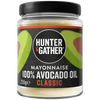Rapeseed oil and canola oil are two of the most popular cooking oils and are often used interchangeably - what's the difference?
What is rapeseed oil?
Rapeseed oil is oil derived from the rapeseed plant, the vibrant yellow vegetable crop which brings colour to the countryside during the summer months.
It is promoted as a healthier cooking oil (more on this later and why we avoid rapeseed oil) and its light colour, neutral flavour and high smoke point make it a very versatile ingredient in the kitchen.
Why they get mixed up: the evolution of canola oil
If rapeseed oil and canola oil both come from rapeseed, what's the difference? To answer this question we need to look back into the history of each.
Rapeseed oil originally fuelled machines, not humans
Rapeseed oil was initially classed as "industrial grade" and used in the automotive industry as biofuel. During the Industrial Revolution, rapeseed oil was used as engine lubricant for steam trains.
Although it had been used as an animal feed for centuries, it was very rarely eaten by humans. Whilst the crop proved to be incredibly drought and disease resistant, it was far too high in a compound named erucic acid - making it unsafe as a food product and acutely toxic to us humans.
How the food industry changed rapeseed oil
The low cost and high yield of rapeseed was appealing to the food industry, but research found that it contained around 50% toxic erucic acid and therefore it was not fit for human consumption.
So, in the 1970s scientists in Canada came up with a solution for this by using traditional plant cross-breeding to genetically modify rapeseed. It was bred to contain lower amounts of erucic acid as well as glucosinolates, which gave the oil a bitter taste.
The result was a plant which contained just 2% erucic acid and tasted much more palatable, therefore could be safely consumed by us humans.
Are rapeseed oil and canola oil the same?
This new variation of rapeseed was originally named Low Erucic Acid Rapeseed (LEAR). Understandably, the name didn't have a gravitational pull for consumers! It was later renamed "Canola" - a combination of "Canadian" and "Ola" (meaning oil).
Simply put, the canola plant is a genetically modified version of the rapeseed plant. So, canola oil is essentially the same as rapeseed oil.
In fact, the vast majority of cooking oils named "rapeseed" are in fact "canola". Whilst the food industry in the USA and Canada accurately differentiate between the two, here in the UK rapeseed and canola can be used interchangeably (as long as the erucic acid content is 2% or less).
Furthermore, most vaguely names "vegetable oils" comprise mainly of rapeseed or canola oil.
Is canola oil healthy?
Rapeseed/Canola is conventionally regarded as a healthier choice when it comes to cooking oils.
But like most veg and seed oils, the trouble is the inflammatory nature and how they are processed.
Refined rapeseed oil is heavily processed and inflammatory
In order to extract oil from the seed, high heat methods are often used to gain the highest yield in the shortest amount of time.
This completely changes the nutritional profile of the oil, reducing the amount of vitamins and transforming healthy fats into harmful trans fatty acids. What's more, chemicals such as hexane are used to bleach and deodorise the oil - introducing toxic solvents to the food chain. Learn more about the trouble with veg and seed oils in our article:
👉 What's the deal with vegetable oils? Why you need to avoid them
It is possible to get cold-pressed, extra virgin rapeseed oil which is minimally processed and much better for you. However, as rapeseed is part of the cabbage family this can have a strong flavour and scent. Therefore, heavily processed and refined rapeseed oil is far more popular - not to mention vastly cheaper and favoured by the food industry.
Rapeseed oil and monocropping
British production of rapeseed has increased from a few thousand tonnes in the 1970s to over 2 million tonnes today. It is estimated that production has doubled in the last 10 years alone - and this doesn't show any signs of slowing!
Aside from health issues associated with widespread consumption of inflammatory oils and trans fats, this also poses a huge problem for the environment.
Intensive farming of rapeseed is bad for the planet
Rapeseed requires intensive farming methods with high inputs of agrochemicals such as pesticides, fungicides, herbicides and fertilisers - which end up washed into rivers by rainfall and impact negatively on biodiversity.
It is also mostly grown as a monoculture, meaning farmers cultivate it as a single crop in a given area. This practice, known as monocropping, depletes the soil of natural nutrients and harms the land due to a lack of crop rotation.
It is thought that the supply chain of British rapeseed oil is neither traceable or environmentally sustainable. However, it should be noted that there are some smaller, Organic farms which produce much more planet friendly rapeseed oil.
Healthy alternatives to rapeseed and canola oil
It's no secret, we really don't like veg or seed oils! That's why all of our products are 100% free from seed oils - including rapeseed.
There are plenty of alternatives to this genetically modified and inflammatory oil, none of which compromise on taste, quality, nutrition or versatility.
Here are some of the best canola oil substitutes:
🥥 Coconut oil
🧈 Ghee
🐄 Tallow
🧈 Butter
You can learn all about what makes each of these a healthier alternative to canola or rapeseed oil in our article below:
👉 The best canola oil substitutes for cooking
References
- Evidence of the health benefits of Canola oil - https://www.ncbi.nlm.nih.gov/pmc/articles/PMC3746113/
- Erucic acid in feed and food - https://efsa.onlinelibrary.wiley.com/doi/10.2903/j.efsa.2016.4593
- Trans fatty acid content of products made with Canola oil - https://www.ars.usda.gov/ARSUserFiles/80400525/Articles/JADA106_867-880.pdf
- Guardian article: the rise of rapeseed oil - https://www.theguardian.com/lifeandstyle/wordofmouth/2012/jun/12/rise-of-rapeseed-oil
- The supply chain of fats: rapeseed oil - https://sustainablefoodtrust.org/articles/the-supply-chain-of-fats-rapeseed-oil/
All information provided on our website and within our articles is simply information, opinion, anecdotal thoughts and experiences to provide you with the tools to thrive.
It is not intended to treat or diagnose symptoms and is definitely not intended to be misconstrued for medical advice. We always advise you seek the advice of a trained professional when implementing any changes to your lifestyle and dietary habits.
We do however recommend seeking the services of a trained professional who questions the conventional wisdom to enable you to become the best version of yourself.
















